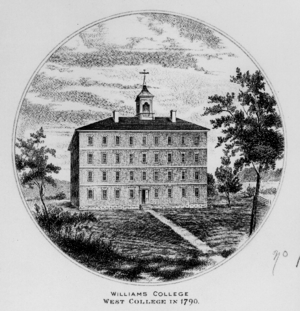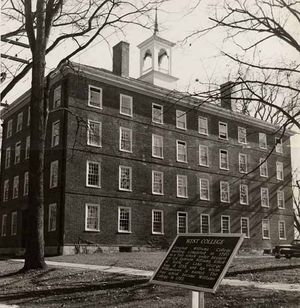| Willipedia is now back online as of 5/5/2019 |
| It has been several years since Willipedia closed. Please help get it updated! |
| Go to the Willipedia 2.0 Project to learn more. |
Difference between revisions of "West College"
StrayCashew (talk | contribs) |
|||
| (11 intermediate revisions by 7 users not shown) | |||
| Line 1: | Line 1: | ||
| − | + | [[Category:Student Housing 2.0]][[Category:Building]] | |
| − | West College is the Mother of all College Buildings. It is the first, and the finest. Technically a row house, due to its location along the "row" with former frat houses, West College is the perennial home of a great number of thesis seniors, especially science seniors, due to its central location in the [[Science Quad]]. | + | [[Image:West_College_in_1790.png|thumb|right|West College as it appeared in 1790]] |
| + | West College is the Mother of all College Buildings. It is the first, and the finest. Technically a row house, due to its location along the "row" with former frat houses, West College is the perennial home of a great number of thesis seniors, especially science seniors, due to its central location in the [[Science Quad]]. | ||
| − | + | West College was built in 1790, just before the founding of Williams, and was destroyed by fire in December of 1950. Reconstruction within the old walls was soon begun, and it was readied for occupancy by the fall of 1952. | |
| − | + | According to [[Sheafe Satterthwaite]], West College is actually built on town land. A discerning eye will notice that along [[Route 2]], all the buildings are set back from the road on both sides, so that a "town green" extends down the length of the road, in front of the row houses and [[Morgan Hall]] on the south side, and in front of the [[Faculty House]], the President's house, the church, etc. on the north side -- ''except'' that West College is built on the town green, right up against the road. The sidewalk, which is parallel to the road everywhere else, has to detour around West College. Look for it next time you're walking along Route 2. | |
| − | + | In the 2003 [[Housing Draw]], however, the powers that be turned some rooms in West into doubles, which, coupled with the 2002 rule that you cannot singly pick into a double until that last ~10 picks in the rising sophomore class, altered the composition of West slightly. The West doubles could not be picked by seniors (seniors ''rarely'' pick into doubles), were not picked by juniors, and ended up going to the lowest pick sophomores -- who were able to pick in alone got them as singles. This fact became one of the grievances against housing draw that year, but the doubles remained. | |
| − | + | Those last two statements are completely untrue. All of the rising sophomores in 2003 who picked into West picked in as doubles. Whoever wrote the above comment might have been thinking of Agard, which in 2003 went ''after'' West in the housing draw, and ''some'' (not all) of the rising sophomores in that house were allowed to live in double rooms by themselves. | |
| − | |||
| − | + | [[Image:West_College_with_plaque.jpg|thumb|right|West College as it stands today]] | |
| − | + | There was once a sighting of those red party cups on the first floor of West, but we can only speculate as to whether there was actually was a party or not... | |
| − | |||
| − | |||
| − | |||
| − | |||
| − | |||
| − | |||
| − | + | Relationships between residents of West College and [[Mission Park]] are considered long-distance relationships. | |
| − | + | Also see the [[Alternative history of West College]]; and the [http://www.williams.edu/library/archives/williamshistory/westcollege.php Archives History of West College], which has a timeline. | |
Latest revision as of 23:58, September 27, 2016
West College is the Mother of all College Buildings. It is the first, and the finest. Technically a row house, due to its location along the "row" with former frat houses, West College is the perennial home of a great number of thesis seniors, especially science seniors, due to its central location in the Science Quad.
West College was built in 1790, just before the founding of Williams, and was destroyed by fire in December of 1950. Reconstruction within the old walls was soon begun, and it was readied for occupancy by the fall of 1952.
According to Sheafe Satterthwaite, West College is actually built on town land. A discerning eye will notice that along Route 2, all the buildings are set back from the road on both sides, so that a "town green" extends down the length of the road, in front of the row houses and Morgan Hall on the south side, and in front of the Faculty House, the President's house, the church, etc. on the north side -- except that West College is built on the town green, right up against the road. The sidewalk, which is parallel to the road everywhere else, has to detour around West College. Look for it next time you're walking along Route 2.
In the 2003 Housing Draw, however, the powers that be turned some rooms in West into doubles, which, coupled with the 2002 rule that you cannot singly pick into a double until that last ~10 picks in the rising sophomore class, altered the composition of West slightly. The West doubles could not be picked by seniors (seniors rarely pick into doubles), were not picked by juniors, and ended up going to the lowest pick sophomores -- who were able to pick in alone got them as singles. This fact became one of the grievances against housing draw that year, but the doubles remained.
Those last two statements are completely untrue. All of the rising sophomores in 2003 who picked into West picked in as doubles. Whoever wrote the above comment might have been thinking of Agard, which in 2003 went after West in the housing draw, and some (not all) of the rising sophomores in that house were allowed to live in double rooms by themselves.
There was once a sighting of those red party cups on the first floor of West, but we can only speculate as to whether there was actually was a party or not...
Relationships between residents of West College and Mission Park are considered long-distance relationships.
Also see the Alternative history of West College; and the Archives History of West College, which has a timeline.

